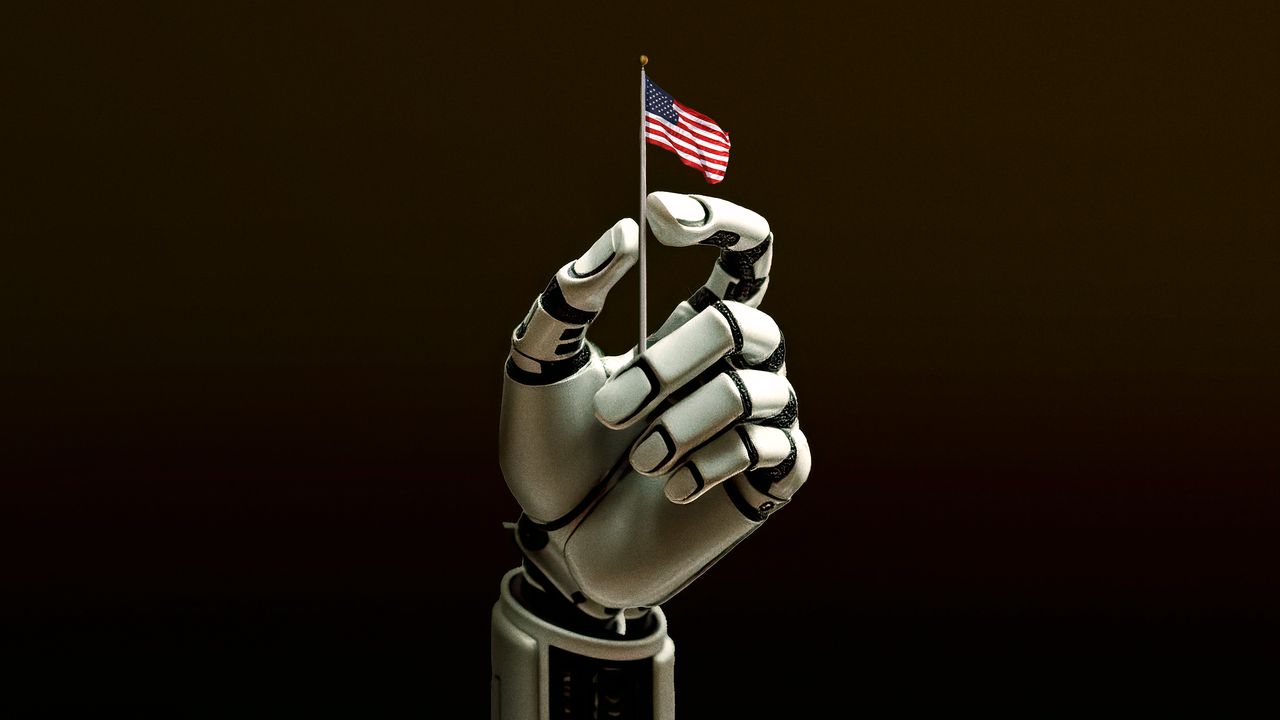A couple of months ago, Vice-President J. D. Vance made an appearance in Washington at the American Dynamism summit, an annual event put on by the venture-capital firm Andreessen Horowitz. Members of Congress, startup founders, investors, and Defense Department officials sat in the audience. They gave Vance a standing ovation as he walked onstage, while Alabama’s “Forty Hour Week (For a Livin’)” played in the background. (“Hello Pittsburgh steel mill worker / Let me thank you for your time / You work a forty hour week for a livin’ / Just to send it on down the line.”) “You’re here, I hope, because you love your country,” Vance told the crowd. “You love its people, the opportunities that it’s given you, and you recognize that building things—our capacity to create new innovation in the economy—cannot be a race to the bottom.” The scene was a snapshot of America’s ongoing and sometimes counterintuitive realignment between Silicon Valley and the New Right.
Over the past few years, Andreessen Horowitz (often talked about in shorthand as “a16z,” a reference to the sixteen letters in between the “A” in Andreessen and the “Z” in Horowitz) has been growing a portfolio of companies that “build for the national interest.” The investments, which fall into a category that a16z calls American Dynamism, are heavily indexed toward defense and space: there’s Castelion, which is developing long-range, hypersonic missiles that are supposedly cheaper and more effective than traditional weapons. And there’s Hadrian, which builds factories that can quickly produce specialized parts for rockets, such as engine nozzles and sections of fuselage. The name American Dynamism describes this investment portfolio, but it’s also a normative claim: that America is good, and that building things that make the country stronger and safer is also good—both morally and financially. Last April, a16z earmarked six hundred million dollars for American Dynamism investments. The companies it supports mostly build products in the physical world—as opposed to, say, apps—and their work is explicitly meant to benefit the United States and its allies. Nearly all of the companies either sell to governments or make products that are heavily regulated. To take one example: American Dynamism invests in SpaceX, which has significant federal contracts with NASA and the Pentagon. But it wouldn’t put money in Tesla, which primarily sells cars to consumers.
Standing backstage watching Vance’s speech was Katherine Boyle, an a16z general partner, who coined the term “American Dynamism” and now oversees the portfolio with a colleague, David Ulevitch. Boyle is an influential tech figure who hasn’t yet achieved main-character status but whose name is constantly dropped in passing. She came up in a recent Semafor story about the group chats of Silicon Valley giants; defense-startup founders in the Gundo, a tech hub near Los Angeles, cited Boyle as “awesome” in an interview with a Vanity Fair reporter. In the same way that the Vice-President is often seen as a bridge between worlds—S.F. to D.C., DOGE to MAGA, techno-optimists to right-wing populists—Boyle is increasingly playing a public-translator role. She’s a devout Catholic in the often secular, left-leaning world of tech. She’s a friend of the pro-family world, while steering clear of Silicon Valley’s tendency toward tech-driven pro-natalism (attempts to invent artificial wombs that could fully gestate babies, that sort of thing). She spent years in D.C. as a reporter for the Washington Post, and brings her understanding of Washington culture to her work with startup founders. Above all, Boyle is the face of American Dynamism—not just as an investment portfolio but as an ethos. “I think America is fundamentally a good country,” she told me recently. “It is O.K. to work on things that say, ‘I unabashedly love this country.’ ” A hype video for the recent summit features images of the American flag and the Statue of Liberty interspersed with rockets and high-tech factory assembly lines. In the background, the intro to a Nascar race plays, in which the actor Kevin James screams, “God bless our troops. God bless America. And, gentlemen, start your engines!”
Boyle got her start as an investor in Silicon Valley around a decade ago. At that time, as she recently put it in a podcast interview, “defense was seen as an issue no one would touch. It was low status.” Google employees staged a protest in 2018 over the company’s involvement in Project Maven, an effort to improve the military’s use of artificial intelligence in drone strikes; the general feeling in the tech world was that Silicon Valley should be building apps for a global market, not making war machines for the American government. Boyle saw this position as out of touch. For a long time, Silicon Valley has been divorced “from the issues that Washington cares about,” she said on the podcast. When Palmer Luckey, the inventor of the Oculus virtual-reality headset, started Anduril Industries, a firm that develops autonomous weapons and surveillance systems, Boyle was an early investor, and she later joined the board. “Silicon Valley friends, colleagues, people at other venture firms were telling me, one, I was an idiot, or, worse, I was a fascist,” Boyle said. (Luckey is a polarizing figure: he maintains that he was fired from Meta in 2017 because he donated to a pro-Trump political group, and he also later designed a prototype of a V.R. headset that could theoretically kill a user in real life when they die in a video game.) Boyle noticed that companies like Anduril which sell to the government—particularly in defense—weren’t very legible to Bay Area venture capitalists. She started using the term “American Dynamism” to describe these kinds of companies. “To say the word ‘America,’ and to say we’re investing in America—it was a shocking business decision,” Boyle told me.
